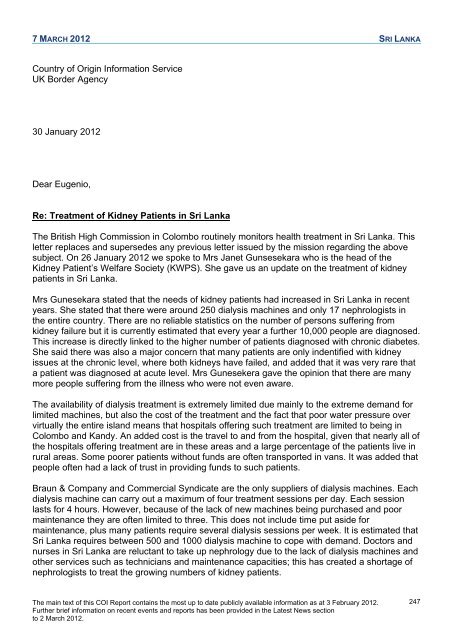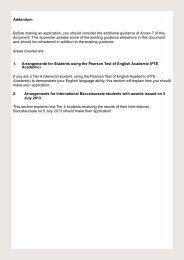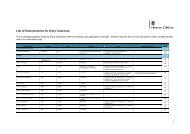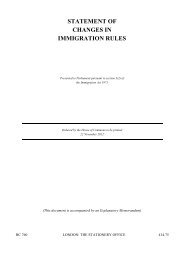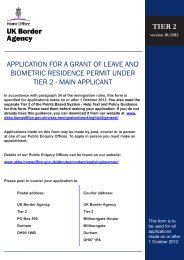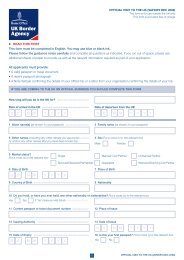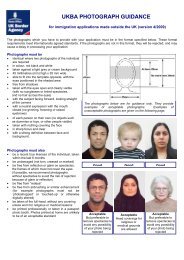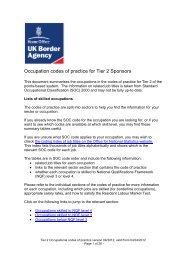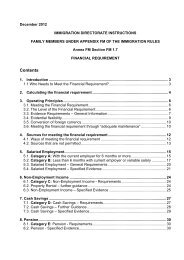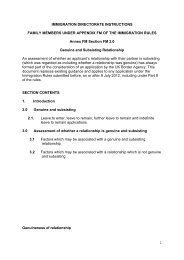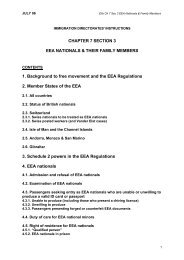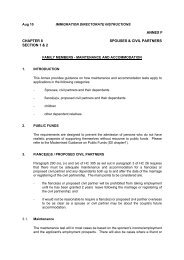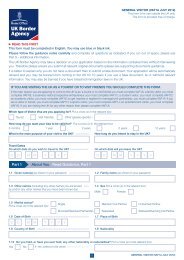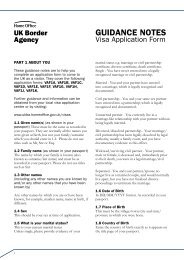COI Report March 2012 - UK Border Agency - Home Office
COI Report March 2012 - UK Border Agency - Home Office
COI Report March 2012 - UK Border Agency - Home Office
Create successful ePaper yourself
Turn your PDF publications into a flip-book with our unique Google optimized e-Paper software.
7 MARCH <strong>2012</strong> SRI LANKA<br />
Country of Origin Information Service<br />
<strong>UK</strong> <strong>Border</strong> <strong>Agency</strong><br />
30 January <strong>2012</strong><br />
Dear Eugenio,<br />
Re: Treatment of Kidney Patients in Sri Lanka<br />
The British High Commission in Colombo routinely monitors health treatment in Sri Lanka. This<br />
letter replaces and supersedes any previous letter issued by the mission regarding the above<br />
subject. On 26 January <strong>2012</strong> we spoke to Mrs Janet Gunsesekara who is the head of the<br />
Kidney Patient‘s Welfare Society (KWPS). She gave us an update on the treatment of kidney<br />
patients in Sri Lanka.<br />
Mrs Gunesekara stated that the needs of kidney patients had increased in Sri Lanka in recent<br />
years. She stated that there were around 250 dialysis machines and only 17 nephrologists in<br />
the entire country. There are no reliable statistics on the number of persons suffering from<br />
kidney failure but it is currently estimated that every year a further 10,000 people are diagnosed.<br />
This increase is directly linked to the higher number of patients diagnosed with chronic diabetes.<br />
She said there was also a major concern that many patients are only indentified with kidney<br />
issues at the chronic level, where both kidneys have failed, and added that it was very rare that<br />
a patient was diagnosed at acute level. Mrs Gunesekera gave the opinion that there are many<br />
more people suffering from the illness who were not even aware.<br />
The availability of dialysis treatment is extremely limited due mainly to the extreme demand for<br />
limited machines, but also the cost of the treatment and the fact that poor water pressure over<br />
virtually the entire island means that hospitals offering such treatment are limited to being in<br />
Colombo and Kandy. An added cost is the travel to and from the hospital, given that nearly all of<br />
the hospitals offering treatment are in these areas and a large percentage of the patients live in<br />
rural areas. Some poorer patients without funds are often transported in vans. It was added that<br />
people often had a lack of trust in providing funds to such patients.<br />
Braun & Company and Commercial Syndicate are the only suppliers of dialysis machines. Each<br />
dialysis machine can carry out a maximum of four treatment sessions per day. Each session<br />
lasts for 4 hours. However, because of the lack of new machines being purchased and poor<br />
maintenance they are often limited to three. This does not include time put aside for<br />
maintenance, plus many patients require several dialysis sessions per week. It is estimated that<br />
Sri Lanka requires between 500 and 1000 dialysis machine to cope with demand. Doctors and<br />
nurses in Sri Lanka are reluctant to take up nephrology due to the lack of dialysis machines and<br />
other services such as technicians and maintenance capacities; this has created a shortage of<br />
nephrologists to treat the growing numbers of kidney patients.<br />
The main text of this <strong>COI</strong> <strong>Report</strong> contains the most up to date publicly available information as at 3 February <strong>2012</strong>.<br />
Further brief information on recent events and reports has been provided in the Latest News section<br />
to 2 <strong>March</strong> <strong>2012</strong>.<br />
247


